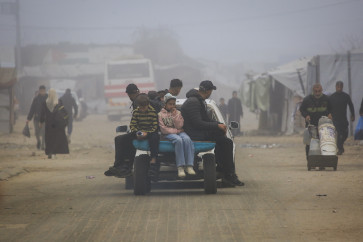Popular Reads
Top Results
Can't find what you're looking for?
View all search resultsPopular Reads
Top Results
Can't find what you're looking for?
View all search resultsNew economic world order emerges
Well seated: President Susilo Bambang Yudhoyono, sitting beside his American counterpart Barack Obama, delivers a speech during the G20 Summit in London on Thursday
Change text size
Gift Premium Articles
to Anyone
Well seated: President Susilo Bambang Yudhoyono, sitting beside his American counterpart Barack Obama, delivers a speech during the G20 Summit in London on Thursday. In his speech, Yudhoyono expressed a desire for the summit to produce a concrete strategy for tackling the global financial crisis. Courtesy of Presidential office/Dino Pati Djalal
The world’s 20 most powerful economies ended their summit Thursday with a set of measures that are hoped to function as a panacea to immediately cure the failing global economy.
Leaders of the G20 member countries walked out of the group’s summit venue in London with a united optimism of turning the course of the world’s economy into a more transparent and accountable financial system.
The group said in a statement that confidence would not be restored until trust in the financial system had been returned.
“Strengthened regulation and supervision must promote propriety, integrity and transparency; guard against risk across the financial system; dampen rather than amplify the financial and economic cycle; reduce reliance on inappropriately risky sources of financing; and discourage excessive risk-taking,” the group said.
Aside from setting out stricter rules for financial companies, the G20 also agreed to shame and name blacklisted tax havens. It will also set out new rules on pay and bonuses for corporate chiefs, and draft details to curb speculation among hedge fund companies, which have been widely blamed for the financial turmoil in the United States that proliferated to other countries.
“Our interests right now are to restore confidence and economic growth at the global level,” Indonesian President Susilo Bambang Yudhoyono told the accompanying Indonesian reporters.
“And that can only be reached with a high degree of financial system transparency, a stimulus package and monetary policies as counter-cyclical measures to help revive global demand and to make the economy run again.”
UK Prime Minister Gordon Brown said he believed a new world order had emerged from the summit.
“A new world order is emerging, and with it we’re entering into a new era of international cooperation,” he said in a press conference.
Other key measures agreed upon included pouring an extra US$1 trillion into international agencies, including tripling the International Monetary Fund's (IMF) financing to US$750 billion.
Yudhoyono said it would require more efforts by developed countries to help strengthen the multilateral financial institutions to help developing and poor countries recover from the crisis, as the cause of the problems stemmed primarily from developed countries.
The group said it had agreed to make available an additional $850 billion of resources through the global financial institutions to support growth in emerging markets and developing countries by helping finance counter-cyclical spending, bank recapitalization, infrastructure, trade finance, balance of payments support, debt rollover and social support.
"It's unfair for underdeveloped and developing countries to be held responsible for the mistakes they didn't make, without the help from the international community," Yudhoyono said.
The G20 members also vowed to promote global trade and investment and reject protectionism, to underpin prosperity, and to build an inclusive, green and sustainable recovery.
The G20 members are Argentina, Australia, Brazil, Canada, China, France, Germany, India, Indonesia, Italy, Japan, South Korea, Mexico, Russia, Saudi Arabia, South Africa, Turkey, the US, the UK and the EU.
G20 key measures
1. G20 countries expect to have spent $5 trillion to counter the economic crisis by the end of 2010.
2. Multilateral agencies will get financing boost worth $1 trillion. This includes a three-fold rise for IMF capital to $750 billion.
3. The IMF will sell billions of dollars of gold reserves to help finance poor countries.
4. To smooth the trade flow, an extra $250 billion will be allocated for trade financing.
5. A concerted effort to shame and name blacklisted tax havens.
6. Setting out new rules on pay and bonuses for corporate executives.
7. Agreement to "act urgently" to conclude the WTO’s Doha round.
8. Establish a new Financial Stability Board (FSB) with a strengthened mandate.










